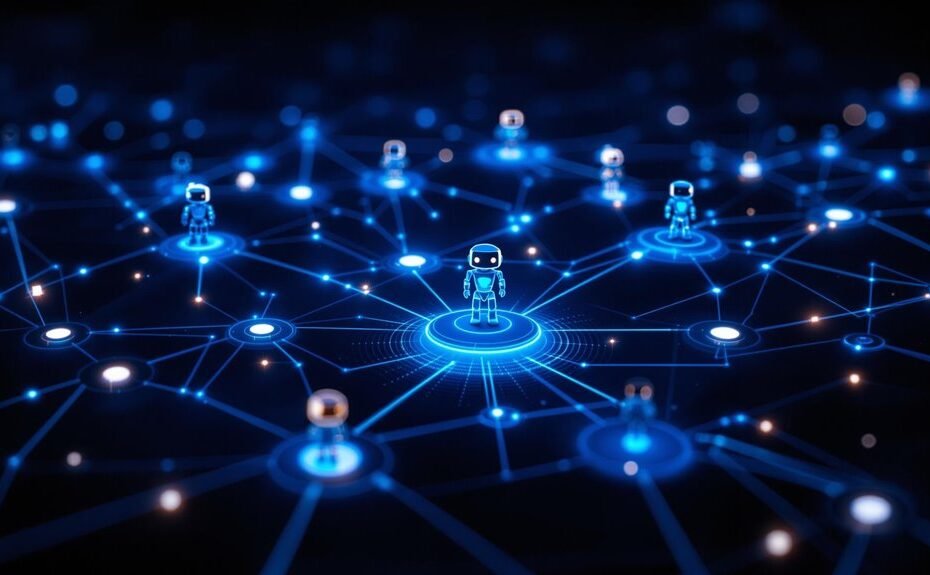You're developing AI systems that require secure collaboration among autonomous agents, and blockchain protocols are key to enabling trustworthy interactions. You'll use protocols like Theoriq and ACTP/IP to promote transparency and accountability. Decentralized data sharing and smart contracts will additionally play a vital role. Private transaction protocols, such as USDC and Masumi, will guarantee secure exchanges between agents. As you investigate these blockchain protocols, you'll uncover how they can be combined to create a robust framework for safe AI agent collaboration, and that's just the beginning of what you'll find.
Need-to-Knows
- Blockchain ensures secure interactions among AI agents.
- Theoriq Protocol enhances transparency and accountability.
- Decentralized platforms facilitate resource sharing.
- Smart contracts automate agreement executions.
- Private protocols regulate AI data and service exchanges.
Secure Agent Communication
You're dealing with multiple AI agents, and they need to communicate securely. To achieve this, you're leveraging decentralized frameworks that utilize blockchain technology. This approach allows secure agent communication, which is vital for trustworthy interactions among AI agents.
Decentralized frameworks, such as the Theoriq Protocol, facilitate transparency and accountability, guaranteeing that all agents operate in a reliable environment.
Through blockchain technology, you're able to promote multi-agent collaboration, allowing AI agents to share information and solve problems seamlessly. Protocols like AutoGen and CrewAI encourage this collaboration, maintaining secure channels of communication.
Additionally, blockchain integration guarantees tamper-proof logging of interactions, providing a secure environment for AI agents to operate without the risk of data manipulation.
Blockchain Network Protocols
Blockchain network protocols form the backbone of a decentralized framework that facilitates secure, transparent interactions between AI agents, ensuring trust and accountability in their operations.
You can utilize blockchain technology to create a decentralized platform where agents can interact, share resources, and collaborate on complex tasks. This platform allows secure and transparent interactions, permitting you to track agent activities and transactions.
You'll find several key features in blockchain network protocols, including:
- Decentralized service registration
- Payment systems for task delegation
- Scalability solutions for high-volume transactions
- Mechanisms for Proof of Contribution
These features permit agents to interact securely and efficiently, while also ensuring fair compensation for their services.
AI Agent Collaboration Tools
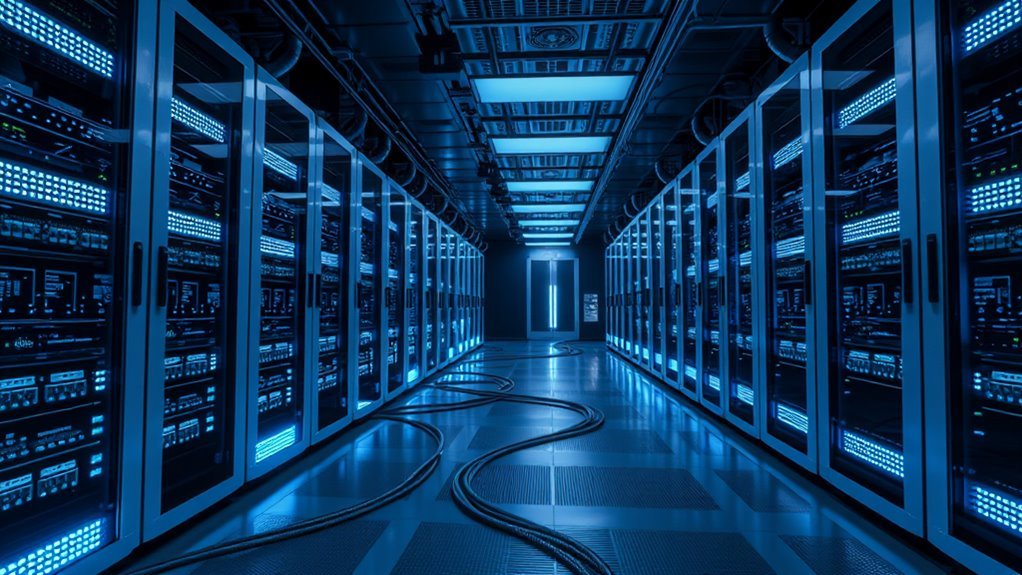
AI agent collaboration tools, like self-organizing networks, facilitate seamless interactions among multiple autonomous agents, enhancing their ability to share information and solve complex problems collectively.
You'll find that these tools, such as AutoGen and Masumi, empower AI agents that work together to achieve common goals more efficiently.
By integrating blockchain technology, you can create a decentralized ecosystem where AI agents can collaborate on complex tasks. This ecosystem relies on collaboration tools that guarantee trust and reliability among participants.
As you investigate these tools, you'll notice that they address key challenges, such as identity verification and capability identification, which are essential for establishing trust and reliability.
Decentralized Data Sharing
Decentralized data sharing revolutionizes the way information is exchanged among autonomous agents, allowing them to access and share data securely without relying on a central authority.
You'll find that blockchain technology plays an essential role in ensuring data integrity and immutability, making it resistant to tampering and unauthorized access. This permits AI agents to collaborate efficiently while maintaining transparency and trust in their interactions.
As you investigate decentralized data sharing, consider the following benefits:
- Enhanced security: utilizing blockchain technology to protect data
- Transparent interactions: promoting trust among AI agents
- Verified identities: integrating Decentralized Identifiers (DIDs) for reliable verification
- Accountable collaboration: facilitating efficient task delegation and logging through protocols like Masumi
Autonomous Transaction Systems
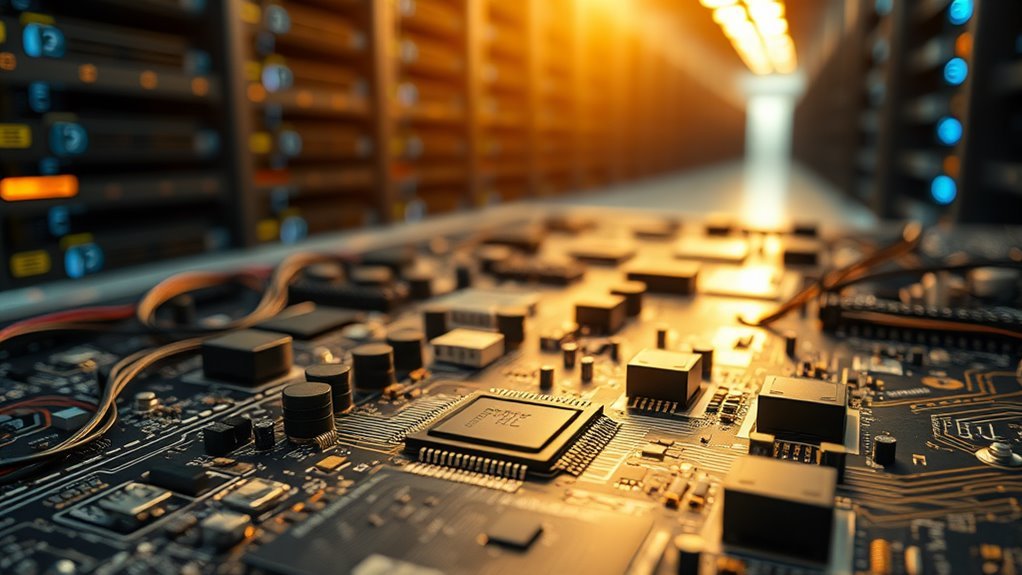
You're now looking at how autonomous systems can facilitate financial operations, building on the concept of secure data sharing among agents. Autonomous transaction systems allow AI agents to execute payments and exchanges independently, guaranteeing efficiency and accuracy. The integration of blockchain technology provides a tamper-proof environment, enhancing data integrity and security during autonomous transactions.
| Feature | Description |
|---|---|
| Autonomous Execution | AI agents execute payments independently |
| Blockchain Integration | Tamper-proof environment for secure transactions |
| Compensation Management | Stablecoins like USDC for precise payment structures |
| Intellectual Property | ACTP/IP facilitates safe exchanges of intellectual property |
| Trust and Reliability | Decentralized management of financial functionalities |
These systems promote trust and reliability within AI-driven applications, leveraging blockchain technology and smart contracts to guarantee secure transactions. By utilizing autonomous transaction systems, you can create a more efficient and reliable financial framework for AI agents, enhancing overall collaboration and performance.
Intelligent Contract Platforms
Within the domain of autonomous systems, intelligent contract platforms emerge as a crucial component, leveraging smart contracts to automate and enforce agreements between agents, thereby ensuring transparency and reducing the need for intermediaries in transactions.
You'll find that intelligent contract platforms utilize blockchain technology to create tamper-proof records of all contractual interactions, improving accountability and trust among autonomous agents.
As you investigate intelligent contract platforms, consider the following benefits:
- Automation: Intelligent contracts automate tasks and decisions, freeing up resources for more complex collaborations between AI agents.
- Decentralization: Blockchain technology permits decentralized applications, allowing AI agents to interact and collaborate securely.
- Scripting capabilities: Many platforms support complex scripting, allowing developers to create custom logic for AI agent interactions.
- Real-time processing: Intelligent contracts facilitate real-time data processing and execution, boosting efficiency in sectors like finance and supply chain management.
You can use these features to improve collaboration between AI agents, making the most of blockchain technology and intelligent contracts.
Trusted AI Interactions
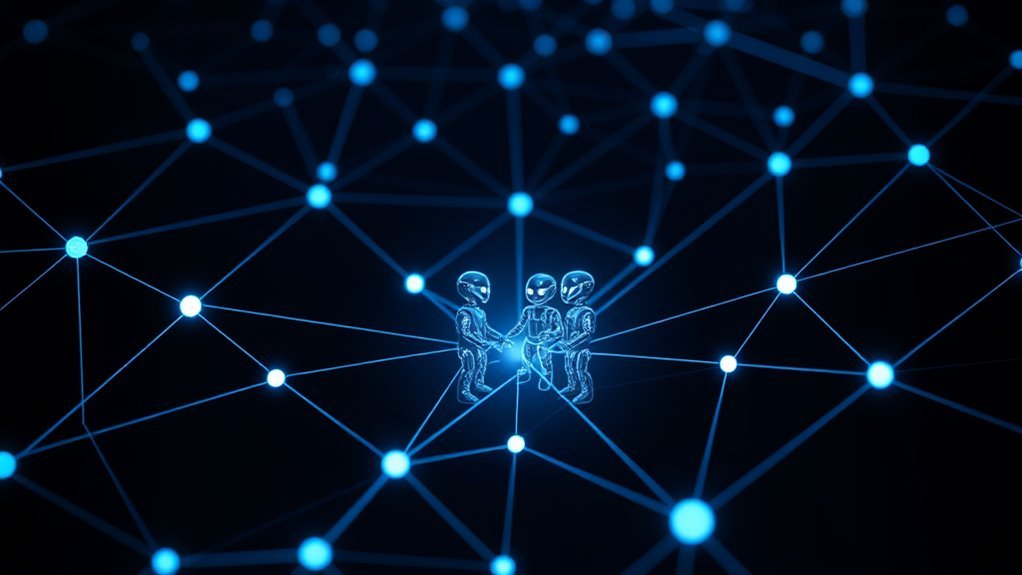
Building on the concept of intelligent contract platforms, it's clear that trust is a fundamental component of successful AI collaborations. You're likely to find that trusted AI interactions are facilitated by decentralized frameworks, which empower AI-driven ecosystems to guarantee transparency and trust in operations.
These frameworks permit AI agents to interact securely, enhancing data integrity and security in their interactions. You can utilize decentralized frameworks to create tamper-proof environments for AI agents, guaranteeing secure interactions and accountability.
Decentralized Identifiers (DIDs) similarly play an essential role in permitting transparency and accountability in AI agent transactions. As you investigate trusted AI interactions, you'll see that protocols like ACTP/IP regulate AI data exchanges, safeguarding AI agent interactions and promoting data integrity.
Blockchain Based AI Networks
As blockchain technology integrates with AI, it's creating decentralized frameworks that boost accountability and transparency in AI agent interactions.
You're witnessing the emergence of blockchain-based AI networks that facilitate secure transactions between AI agents. These networks utilize blockchain technology to guarantee data integrity and promote trust in AI-driven applications.
You can engage with blockchain-based AI networks in several ways:
- Exploring decentralized frameworks that improve accountability and transparency
- Facilitating secure transactions between AI agents
- Promoting community governance and equitable incentives
- Regulating exchanges between AI agents for safe and fair environments
Secure Multi Agent Systems
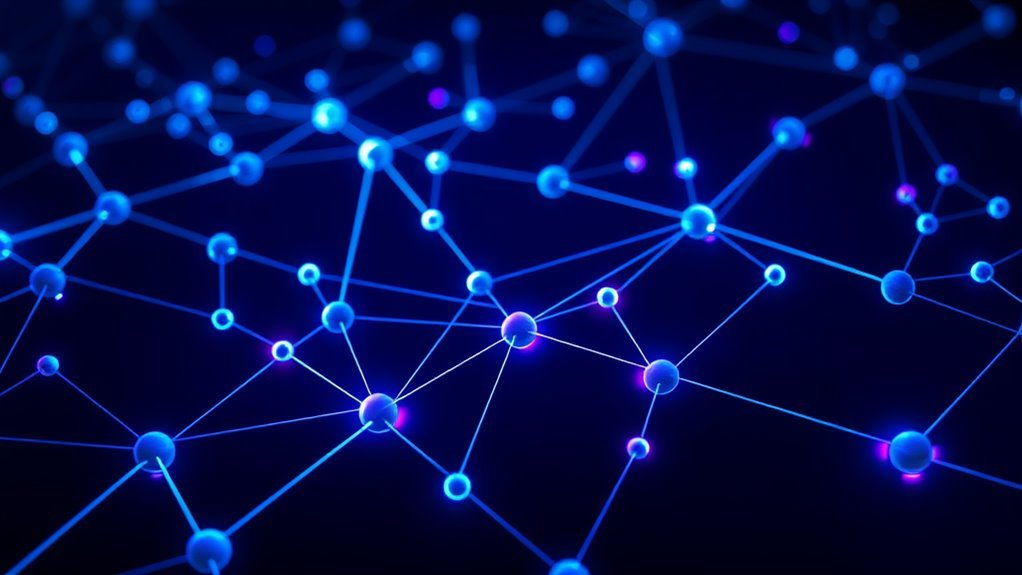
You're now entering a domain where blockchain technology empowers secure multi-agent systems, establishing trust and transparency among AI agents. This facilitates reliable interactions and guarantees data integrity, which is vital for autonomous operations.
You'll find that secure multi-agent systems utilize blockchain technology to authenticate agents, facilitating secure transactions and reducing the risk of fraud.
As you explore deeper, you'll see that smart contracts play a key role in automating the execution of agreements between agents, minimizing human intervention and enhancing operational efficiency.
The integration of blockchain's immutable ledger provides a tamper-proof record of all transactions and interactions, promoting accountability and traceability in multi-agent collaborations.
This setup allows you to focus on task delegation and job request reception, all within a secure framework.
Private AI Transaction Protocols
Someone looking to facilitate secure exchanges between autonomous AI agents will find private AI transaction protocols to be a crucial component.
These protocols, such as the Agent Transaction Control Protocol for Intellectual Property (ACTP/IP), allow AI agents to securely exchange intellectual property on blockchain. You'll notice that private transaction protocols utilize decentralized frameworks to provide transparency and trust for AI-driven ecosystems.
You can expect private AI transaction protocols to offer the following benefits:
- Enhanced data integrity: by integrating blockchain technology
- Secure transactions: ensuring that contributions are recognized and compensated appropriately
- Tamper-proof environment: for AI operations, enhancing overall security
- Regulated exchange: of data and services between autonomous AI agents, addressing critical issues related to AI data misuse.
Most-Asked Questions FAQ
How Can Blockchain and AI Be Used Together?
You can use blockchain and AI together by implementing AI governance, Blockchain identity, and smart contracts to guarantee data integrity in collaborative networks.
What Is Decentralizing AI Using Blockchain Technology for Secure Decision Making?
You're creating decentralized systems with secure networks, enabling collaborative intelligence, trust protocols, and governance frameworks to facilitate knowledgeable choices.
What Is Blockchain for Securing Ai Applications and Open Innovations?
You use blockchain to secure AI applications, ensuring data integrity via smart contracts, trust frameworks, and decentralized identity, promoting collaborative ecosystems that drive open innovations.
What Is the Three Way Relationship Between Blockchain AI and the Cloud?
You integrate blockchain, AI, and cloud, leveraging blockchain scalability, AI transparency, and cloud security for decentralized storage and collaborative intelligence, enhancing overall system trust and efficiency.
Conclusion
You'll increase safety and trust in AI interactions by utilizing these blockchain protocols. They allow secure communication, decentralized data sharing, and autonomous transactions. You can guarantee trusted AI interactions and create private transaction protocols. By leveraging these tools, you'll facilitate seamless collaboration among AI agents, making your systems more reliable and efficient.
